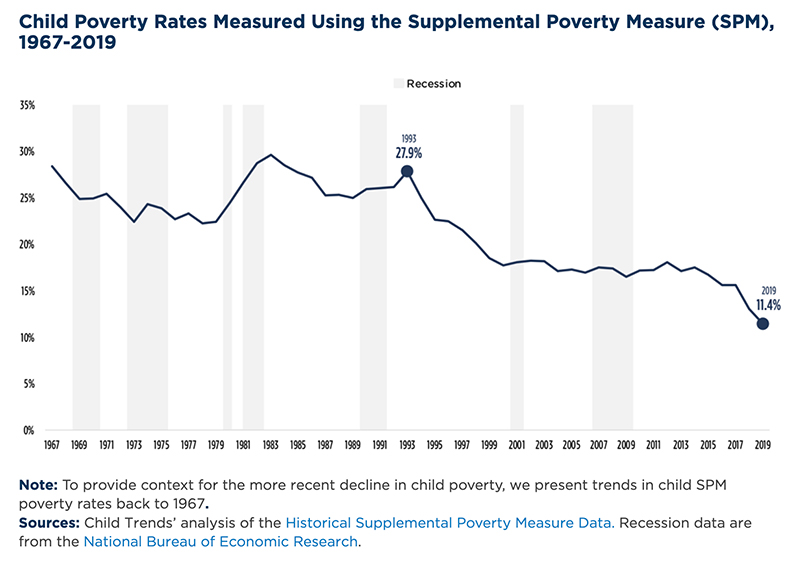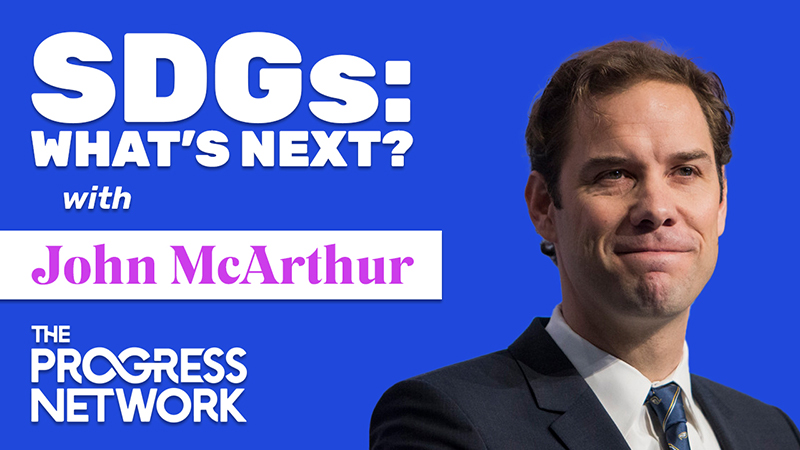Volcanoes are erupting in The Philippines, but on-fire Australia received some welcome rain. The Iran war cries have been called off and The Donald’s military powers are about to be hamstrung by the Senate. Meanwhile, his impeachment trial is starting, and we’re all on Twitter for a front-row seat.
What Could Go Right? Can we quit the 90s nostalgia?
The receipts have arrived: the world is demonstrably better off today than it was 30 years ago.
This is our weekly newsletter, What Could Go Right? Sign up here to receive it in your inbox every Thursday at 6am ET. You can read past issues here.
Progress is a fact
In 2015, almost 200 countries got together and agreed to 17 goals for improving life on Earth. These Sustainable Development Goals (SDGs) cover everything from climate action to eliminating hunger, with 2030 set as the target year for meeting them. This Tuesday, the Bill & Melinda Gates Foundation released its annual report on how the world is doing when it comes to the SDGs.
The bad news: Forecasting 15 years into the future, no one expected a worldwide pandemic or a war in Ukraine that would threaten food stability in Africa. These events have caused real setbacks in our progress toward the SDGs. The good news: Tracking across the past 30 years, we have still improved when it comes to almost every goal.
For example, with the exception of the last bullet point below, which includes data from the last decade only, these are some of the changes we have made since 1990:
- The share of the global population with access to clean water and sanitation has increased by 100 percent.
- Children under five are now around 30 percent less likely to be stunted or malnourished.
- Maternal deaths per 100,000 live births have declined by 40 percent.
- The prevalence of 15 neglected tropical diseases, like dengue and leprosy, has declined by more than 70 percent.
- 76 percent of adults worldwide now own a financial account, up from 51 percent a decade ago. (In developing countries, 71 percent of adults now own a financial account, representing a 30-percentage point increase over the last decade.)
As journalist Derek Thompson put it in an Atlantic piece about the report, “it is hard to argue that human progress is some sort of sales pitch from the pathologically optimistic. Progress is simply a fact.”
It’s unlikely that we’ll meet the SDGs by 2030—the report says we would need to multiply our current pace by five to do so. But the same principle of unknowability that made it impossible to predict this decade’s crises applies to good fortune as well. “No projection can ever account for the possibility of game-changing innovation,” Melinda French Gates and Bill Gates write in the introduction, “because when those breakthroughs happen, they change all the fundamental assumptions embedded in that equation.”
You can take a spin through the report yourself here. It’s user-friendly.
A side note on vaccines
Another bright figure from the report is that we have cut the percent of children who die before reaching five years old in half, from 8 percent in 1990 to 3.6 percent in 2021. Speaking to Thompson in The Atlantic, Bill Gates attributed the success to getting “vaccines out to almost all of the children in the world.”
In that vein, we were thrilled this week by the announcement of the most effective malaria vaccine yet. It’s the first one to reach—and surpass—the World Health Organization’s efficacy target of 75 percent. Production is waiting on results from a larger trial, but ideally should begin in 2023.
And another vaccine that Gates himself has his eye on is one that prevents pneumonia, the leading cause of death among children under five.
Before we go
World-changing they may not be, but coffee-industry-changing? Maybe . . . anyway, we adore these new, fully compostable “coffee balls” from Swiss company Migros. Chuck your plastic Nespresso capsules in favor of these caffeinated rolie-polies wrapped in a flavorless seaweed husk that you can dispose of guilt-free! Okay, yeah, you have to buy their special coffeemaker to use the balls. But the system is no-waste, so we’re feeling positive about “ballin’ out” becoming the latest coffee trend.
Another week, another country going through a paradigm shift in human rights. Vietnam’s Ministry of Health has issued guidance that being gay, bisexual, or transgender “is not an illness” and cannot be “cured.” Advocacy groups have set their sights on same-sex marriage next.
And, a small collection of potential progress we’re watching in the United States: 1) President Biden’s “moonshot” to reduce the death rate from cancer by 50 percent in 25 years; 2) whether the Internal Revenue Service might really offer free e-filing one day; and 3) the status of the country’s first potential over-the-counter birth control pill.
Below in the links section, a breakthrough for saving coral in Florida, carbon capture devices for small emitters in Japan, anti-censorship tools for reading blocked news in Russia, and more.
Secretly Sexy
A pop-up section in which we celebrate numbers that represent substantial improvement in people’s lives
- 40 million | The number of people worldwide working in clean energy jobs. It’s the first time clean energy jobs have outnumbered ones associated with fossil fuels.
- 11% | The percentage of American adults who report being smokers, down from a high of 45% in the mid-1950s
- 87.8% | The adult literacy rate in Cambodia in 2020, up from 77.6 percent in 2008

Are we really addicted to technology?

When we say we’re addicted to something, we stop asking what our behavior is a response to, and give up the power we have to change it. | Read more
What’s Next for the World?

Since we’re on the topic of SDGs today, we’re revisiting our conversation with TPN Member John McArthur, director of the Center for Sustainable Development at the Brookings Institution, about how nations and governments push forward on “all the big stuff.” | Listen to the episode
Progress, Please
(Found good news? Tweet at us @progressntwrk or email.)
Other good stuff in the news 🚛
Environment:
- Scientists make major breakthrough in race to save Caribbean coral | CNN
- Remember that coal surge last year? Yeah, it’s over | Inside Climate News
- Reasons for (cautious) optimism: the good news on the climate crisis | The Guardian
- China rust belt province plans $87 billion clean energy overhaul | Bloomberg
- Coal plant operator to buy out co-owner, install some wind | AP
Science & Tech:
- Korean nuclear fusion reactor achieves 100 million°C for 30 seconds | New Scientist
- Five scientific breakthroughs to cheer you up | Financial Times
- Air conditioning has a climate problem. New technology could help. | The Washington Post
- Japan rolls out carbon capture devices for small emitters | Bloomberg
- United Airlines is investing millions in electric air taxis | The Hill
- Cheaper electric vehicles coming despite high battery costs | AP
- Tesla’s electric semi truck took too long—so these truckers built their own version | Inverse
- The US doesn’t know where its critical minerals are. AI could help find them. | Protocol
Politics & Policy:
- EU moves to ban products made with forced labor | ABC News
- The Philippines makes its first move towards offshore wind | Energy Monitor
- Clean energy projects surge after US climate bill passage | The New York Times
- Australia sets new climate target in landmark bill | BBC
- Michigan’s high court puts abortion question on Nov. ballot | AP
- VA plans to offer abortions for veterans regardless of state laws | The Washington Post
- South Carolina senators reject a near-total abortion ban | NBC News
Public Health:
- US monkeypox outbreak is slowing as vaccines become more accessible | CNBC
- US records milestone 1 millionth organ transplant | ABC News
- At long last, we might have an HIV vaccine | Freethink
- China and India approve nasal Covid vaccines—are they a game changer? | Nature
Society & Culture:
- US Soccer, players formally sign equal pay agreements | AP
- MLB is ready to recognize a union for the minor leagues | NPR
- Finally, there is no ‘wrong’ hair for swimming | The Guardian
- How two former debt collectors made $6.7 billion in medical debt disappear | Reasons to Be Cheerful
- Senegal leads way on women legislators but challenges ahead | Africanews
- This clever anti-censorship tool lets Russians read blocked news | Wired
- Iran close to eradicating illiteracy | Tehran Times
Economy:
- US jobless claims fall for fourth straight week | The Wall Street Journal
- Inflation showed signs of easing in several industries in August | The Wall Street Journal
- Why “zero-down” mortgages are gaining ground | Axios
- Americans are finally feeling better about the economy | The Washington Post
TPN Member originals 🧠
(Who are our Members? Get to know them.)
- Republican reversal: The worst economic idea from what used to be the ‘party of ideas’ | James Pethokoukis
- Finding opportunities in hard situations | Jason Feifer
- Are you empathetic? Try compassion instead. | Arthur C. Brooks
- Racism is a big deal: Which is exactly why highlighting racial disparities can be counterproductive | Matthew Yglesias
- Artificial intelligence could be a great equalizer | Tyler Cowen
- Affordable housing in the 21st century | Avik Roy
- The immortal awfulness of open plan workplaces | David Brooks
- The power of dignity: Transforming justice can heal our community | Victoria Pratt
- Chloé Valdary on how to be a (true) antiracist | Yascha Mounk
- Two new maps to notice: Additional tools for thinking globally and acting locally. | James Fallows
- Labor and our nation’s workers | Scott Galloway
- Remembering Barbara Ehrenreich, acid wit and workers’ champ | Alissa Quart
- On America’s ‘Third Reconstruction’ | Peniel E. Joseph
- How the ‘rise of the rest’ became the ‘rise of the rents’ | Richard Florida
- Supercharging US clean energy and achieving net zero 2050 globally | Ian Bremmer
- Why we’re so clueless about Putin | Robert Wright
- A long night in Baghdad | Faisal Saeed Al Mutar
- Mark Cuban doesn’t believe in following your passions | Adam Grant
- Putin will make people choose between heating or eating this winter | Thomas L. Friedman
Department of Ideas 💡
(A staff recommendation guaranteed to give your brain some food for thought.)
The myth of ideological polarization | The Wall Street Journal
“Left” and “right” are illusory categories. What we’re really experiencing is tribal hostility.
Why we picked it: What do “left” and “right” even mean anymore? The answer might be “nothing,” itself a kind of freedom. Pair this op-ed from the summer with this follow-up interview in the Tangle newsletter, which is lengthier but thought-provoking. —Emma Varvaloucas
Upcoming Events
- Global Cohesion & Solidarity—On Food, Shelter & Economies | Parag Khanna | Today
- The Racial Reckoning of the Third Reconstruction | Peniel E. Joseph | Today
- Festival of Dangerous Ideas: American Decadence | Ruth Ben-Ghiat | September 18
Until Next Time
Make no mistake: the progress presented in this newsletter, while big, has been shown at actual size.👇


